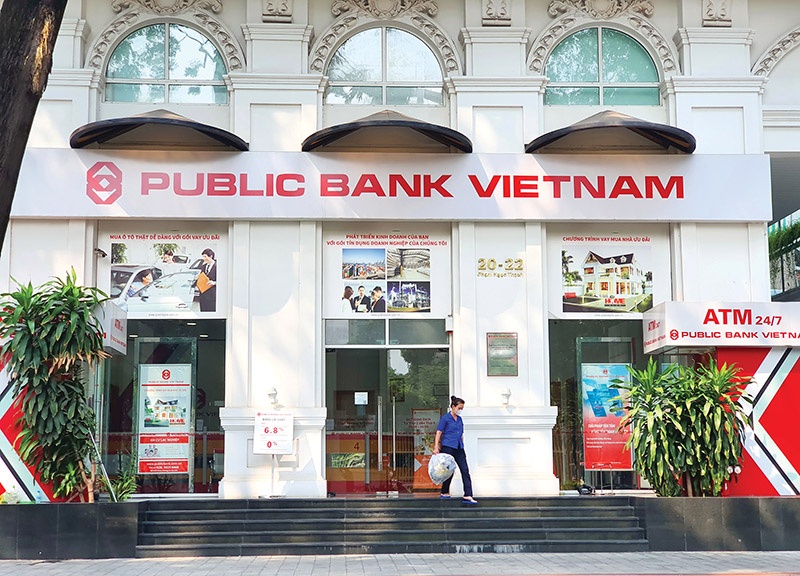Foreign banks jostle for increased share
 |
| Assets of joint-venture and foreign banks only account for a tenth of the total in Vietnam’s whole system, Le Toan |
Australia-based lender ANZ Vietnam reported a 78 per cent drop in profit in its 2021 consolidated financial statement, with a total of VND87.8 billion ($3.8 million) in earnings. After selling its retail business in Vietnam to Shinhan Bank to focus on institutional banking services in 2017, ANZ Vietnam’s earnings have fallen to its lowest level. In the course of the year, banking operations saw a downturn.
UK-backed HSBC Vietnam, in the same vein, has seen its profits decline over the previous three years. This bank’s earnings were VND1.6 trillion ($71.6 million) in 2021, down 17 per cent from 2020. The primary cause for the drop is that the bank’s provision expenditures surged tenfold compared to the previous year, coupled with slightly higher operating expenses.
HSBC Vietnam, however, still remains the largest foreign bank in the country, with total assets of VND163.7 trillion ($7.12 billion) and the charter capital above VND7.5 trillion ($326 million).
Hong Leong Bank Vietnam, meanwhile, reported a pre-tax loss of VND12.9 billion ($560,900) for the first six months of 2021.
Hong Leong Bank Berhad, a member of Hong Leong Group, is the first foreign bank from ASEAN to establish a wholly-owned subsidiary in Vietnam in 2009.
In contrast to the bleak outcomes, Shinhan Vietnam recently announced its summary audited financial statement for 2021, which showed a pre-tax profit of VND3.16 trillion ($137.4 million), an increase of 3 per cent over the previous year.
Net interest income, Shinhan Vietnam’s most important source of revenue, climbed by about 12 per cent to roughly VND5 trillion ($217.4 million), due to significant growth in credit services. The bank’s net profit from foreign exchange services and operations both climbed by 27.8 per cent and 18.3 per cent, respectively, over the same period in 2021.
After a nine-month pre-launch preparation period, subsidiary Shinhan Life also started its maiden forays into Vietnam’s burgeoning insurance market last month, contributing to a comprehensive Shinhan Group ecosystem in the Southeast Asian country.
According to Shinhan Life Vietnam’s CEO, Lee Eui Chul, this company would concentrate on bancassurance services first, and then move into telemarketing and digital marketing in the future.
Koreatimes reported that South Korean banks’ overseas operations saw their earnings jump nearly 62 per cent in 2021 from a year earlier on higher interest income.
Specifically, operations in Cambodia reported the biggest profit growth of $290 million, followed by those in Hong Kong with $214 million and those in Vietnam with $172 million, cited South Korea’s Financial Supervisory Service.
Meanwhile, Kuala Lumpur lender Public Bank has maintained a healthy growth rate in Vietnam over the last six years, with a consistent rise in earnings. The profit before tax of Public Bank Vietnam totalled VND476 billion ($20.7 million) in 2021, representing a 13 per cent increase over the previous year.
According to statistics compiled by the State Bank of Vietnam (SBV), the total assets of joint-venture and foreign banks in Vietnam only accounted for around 10.4 per cent of the total assets of the entire banking system, as of the end of September 2021.
By the second quarter of 2021, the SBV estimated that the foreign banks’s return on assets ratio was 0.37 per cent, lower than the ratios of state-owned banks (0.55 per cent) and privately-held banks (0.87 per cent).
| Kang Gew Won - CEO, Shinhan Bank Vietnam
Shinhan Bank Vietnam’s growth is guided by a “friendly bank” strategy. It focuses on enhancing customers’ experience as the primary goal, working toward personalising financial products/services, and continuously refining procedures to deliver simplicity, safety, and responsiveness that optimally match the financial demands of each individual customer segment. Shinhan Bank Vietnam also aspires to accelerate digital transformation by automating the process of providing clients with secure and convenient financial services, as well as keeping up with contactless payment trends. The bank also continues to foster an ideal working environment for its staff by providing more opportunities for their professional growth. We try to help our staff sharpen their knowledge via on-the-job training and community service projects. Customer needs are constantly changing, and Shinhan Bank Vietnam should actively innovate to fulfil varied needs. In a challenging business environment like Vietnam, flexible adaptation is important to create long-term value and success for the bank and customers. |
What the stars mean:
★ Poor ★ ★ Promising ★★★ Good ★★★★ Very good ★★★★★ Exceptional
Related Contents
Latest News
More News
- Private capital funds as cornerstone of IFC plans (February 20, 2026 | 14:38)
- Priorities for building credibility and momentum within Vietnamese IFCs (February 20, 2026 | 14:29)
- How Hong Kong can bridge critical financial centre gaps (February 20, 2026 | 14:22)
- All global experiences useful for Vietnam’s international financial hub (February 20, 2026 | 14:16)
- Raised ties reaffirm strategic trust (February 20, 2026 | 14:06)
- Sustained growth can translate into income gains (February 19, 2026 | 18:55)
- The vision to maintain a stable monetary policy (February 19, 2026 | 08:50)
- Banking sector faces data governance hurdles in AI transition (February 19, 2026 | 08:00)
- AI leading to shift in banking roles (February 18, 2026 | 19:54)
- Digital banking enters season of transformation (February 16, 2026 | 09:00)


 Tag:
Tag:



















 Mobile Version
Mobile Version